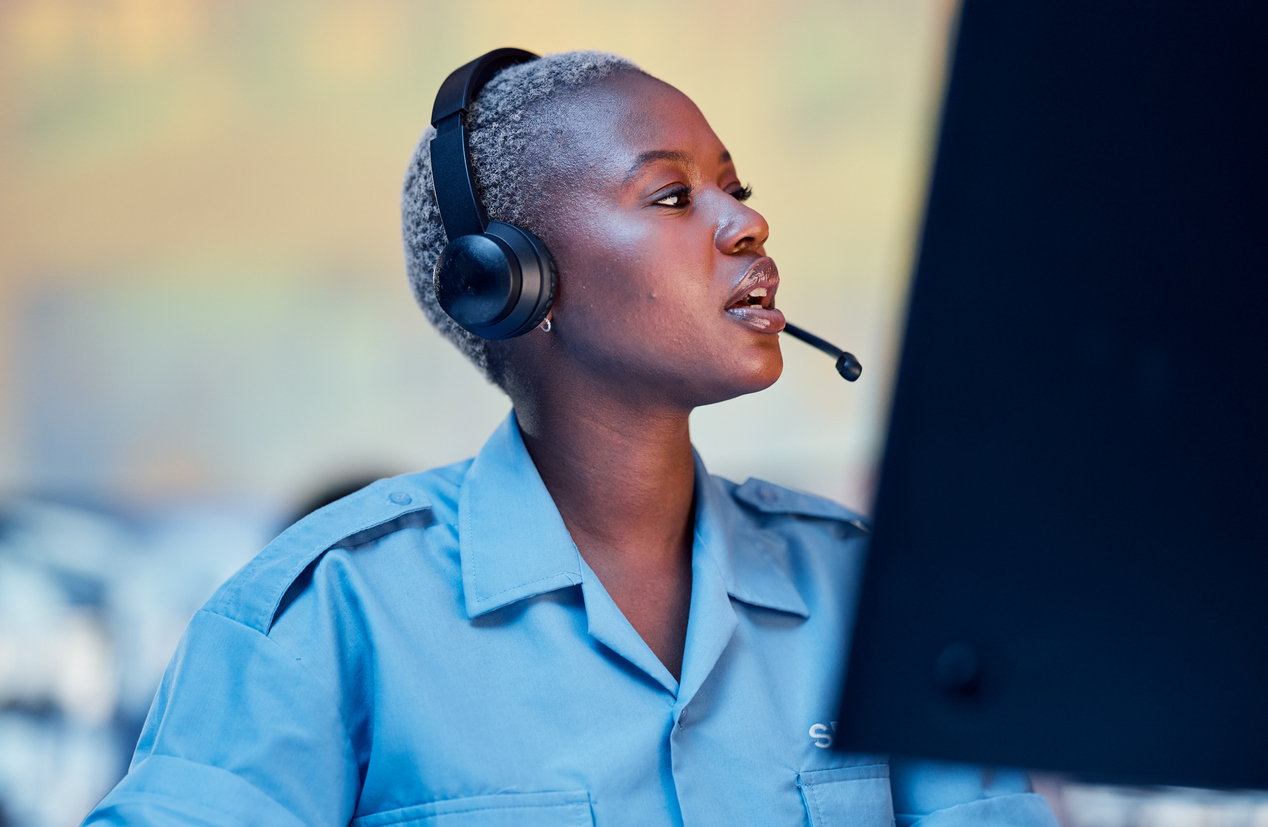Understanding the Role of a Foreign Service Officer
Written by:
East Carolina University®
• May 15, 2025

Understanding the Role of a Foreign Service Officer
In a 2024 U.S. News & World Report survey to determine the most influential countries in the world, there was one clear winner: the United States. The nation was voted the world leader, with the most connectivity with the rest of the world, the most influential culture, the most political influence, and the most international alliances. Much of this influence is thanks to the work of foreign service officers.
Foreign service officers represent the United States in negotiations with foreign governments, finding ways to advance U.S. interests and promote peace worldwide. Many of these officers begin their careers with a bachelor’s degree focused on security studies. They use this educational background to develop professional experience and start as foreign service officers in one of five unique fields.
What Does a Foreign Service Officer Do?
Foreign service officers work for the U.S. Department of State, essentially serving as diplomats at one of more than 270 locations around the world. Their goals are to advance U.S. vital national interests, address global issues, build alliances, and promote peace throughout the world.
Many of these federal employees are foreign service generalists who work in one of five career tracks: consular, economics, management, political, and public diplomacy. Others become foreign service specialists, with 19 career paths in six categories: administration, building operations and construction, information technology, public engagement and English language programs, law enforcement and security, and medical and health.
Foreign Service Officer Job Description
The job description of a foreign service officer varies based on their career track. The job duties and responsibilities of Consular Officers include the following:
-
Adjudicating visas and passports
-
Facilitating adoptions
-
Evacuating U.S. citizens from foreign countries
-
Combating fraud and human trafficking
The job duties and responsibilities of Economic Officers include the following:
-
Building and maintaining positive economic and trade relations
-
Developing relationships with important economic figures
-
Promoting U.S. economic interests
-
Analyzing economic conditions in their host country
The job duties and responsibilities of Management Officers include the following:
-
Managing all embassy operations
-
Developing relationships with contacts in their host country
-
Hiring and training embassy personnel
-
Problem-solving for U.S. staff and local staff, as well as foreign and U.S. ambassadors
The job duties and responsibilities of Political Officers include the following:
-
Analyzing and reporting on local issues and how they affect the United States
-
Studying the local culture and history
-
Maintaining contacts with leaders and officials in their host country
-
Supervising locally hired political specialists
The job duties and responsibilities of Public Diplomacy Officers include the following:
-
Working with local and foreign media to promote U.S. interests
-
Managing cultural and information programs
-
Coordinating exchange programs
-
Overseeing the Public Affairs Section of the U.S. Embassy in their host country
Foreign Service Officer Job Outlook and Salary
The Foreign Service is experiencing a hiring surge, making it an ideal time to begin training for this fulfilling, lucrative career. With a bachelor’s degree in a relevant field, officers can expect higher starting salaries than if they started without a degree.
Job Outlook
According to Joan Polaschik, director of the Foreign Service Institute (FSI), the Foreign Service is hiring more than 900 foreign service officers every year. She says that the Foreign Service saw 20% to 30% growth between 2020 and 2023.
Average Salary
According to Payscale, the average salary for foreign service officers was $77,419 as of October 2023. However, salary figures for this position are variable and determined by Standard Operating Procedures Notice No. 134A5, the document that sets the salary standards for entry-level foreign service officers. This document sets a candidate’s grade and step based on their level of education and years of professional experience. For example, someone with a bachelor’s degree and no professional experience would be considered FP-6, Step 5.
In addition to salary, foreign service officers receive several benefits, including 12 work weeks of paid parental leave and the potential for student loans to be forgiven depending on their location assignment.
Planning for a Career as a Foreign Service Officer
As representatives of the United States abroad, foreign service officers must meet specific requirements. They also must be willing to be lifelong learners, as they’re expected to continuously learn about the countries where they’re stationed.
Education Requirements
While there’s no specific degree that an aspiring foreign service officer must obtain, most foreign service officers hold a bachelor’s degree or higher. However, foreign service officers tend to come mostly from social science fields. Useful areas of focus include security studies , global affairs, political science, and foreign languages.
Professional Experience and History
Foreign service officers need professional experience, such as military service or work with international or government agencies, to obtain a higher starting salary and demonstrate a commitment to public service.
Additionally, they must meet several personal requirements , including the following:
-
Being a U.S. citizen
-
Being between the ages of 21 and 59 on the day of appointment
-
Having availability for assignments domestically and abroad
-
Passing any tests associated with the position, including the Qualification Evaluation Panel (QEP) and the Foreign Service Officer Test (FSOT) and Foreign Service Officer Assessment (FSOA), as well as all medical, security, and suitability clearances
Necessary Skills
When hiring foreign service officers, the State Department looks for 11 key skills, or dimensions:
-
Critical Thinking: Show flexibility and innovative thinking and consider multiple points of view to make a sound judgment.
-
Cultural Adaptability: Work harmoniously with people of diverse cultures, value systems, political beliefs, and economic circumstances.
-
Motivated and Experienced: Be public service-oriented and able to demonstrate knowledge and skills from previous experience related to the Foreign Service.
-
Information Integration and Analysis: Absorb and analyze information, and recognize patterns and trends to draw conclusions.
-
Leadership: Motivate others and take responsibility.
-
Negotiation: Resolve disagreements to maintain mutually beneficial relationships.
-
Objectivity and Integrity: Be fair and honest, and don’t introduce bias.
-
Planning and Organizing: Prioritize tasks effectively, and make appropriate use of resources.
-
Presentation Skills: Present findings fluently, in an organized manner, and using appropriate communication styles for the audience.
-
Teamwork: Interact in a constructive and cooperative manner, and maintain positive relationships.
-
Written Communication: Write both concisely and comprehensively.
Become a Public Servant to the World as a Foreign Service Officer
Foreign service officers work to advance U.S. interests but also serve as agents for peace. They strive to help nations around the world and build mutually beneficial alliances. Thanks to foreign service officers, the United States maintains its standing as the most influential nation. At East Carolina University®, students can prepare for this rewarding career with its online Bachelor of Science (BS) in Security Studies .
From becoming a foreign service officer with the State Department to becoming an intelligence officer or intelligence analyst with the Central Intelligence Agency (CIA) or the Department of Defense (DoD), this versatile degree can pave the way to becoming a dedicated public servant. Students learn to coordinate solutions to complex situations at the international, federal, state, and local levels. Graduates walk away with a deep, multifaceted understanding of global security challenges from courses in political science, criminal justice, geography, history, and threats and policy responses.
Find out how ECU can help you embark on a rewarding public service career.
Recommended Readings
What Is a Defense Intelligence Agency (DIA) Intelligence Officer?
What Is Intelligence Collection, and Why Does It Matter?
Sources:
Indeed, “How to Become a Foreign Service Officer (FSO) or Diplomat”
Path to Foreign Service, “Foreign Service Officer Salary: A Comprehensive Guide (2023 Update)”
Payscale, Average Foreign Service Officer Salary
U.S. Department of State, Consular Career Track
U.S. Department of State, Economic Career Track
U.S. Department of State, Foreign Service
U.S. Department of State, Foreign Service Dimensions
U.S. Department of State, Foreign Service Officer
U.S. Department of State, Foreign Service Officer Benefits
U.S. Department of State, Foreign Service Salaries
U.S. Department of State, FSO Career Tracks
U.S. Department of State, Management Career Track
U.S. Department of State, Political Career Track


